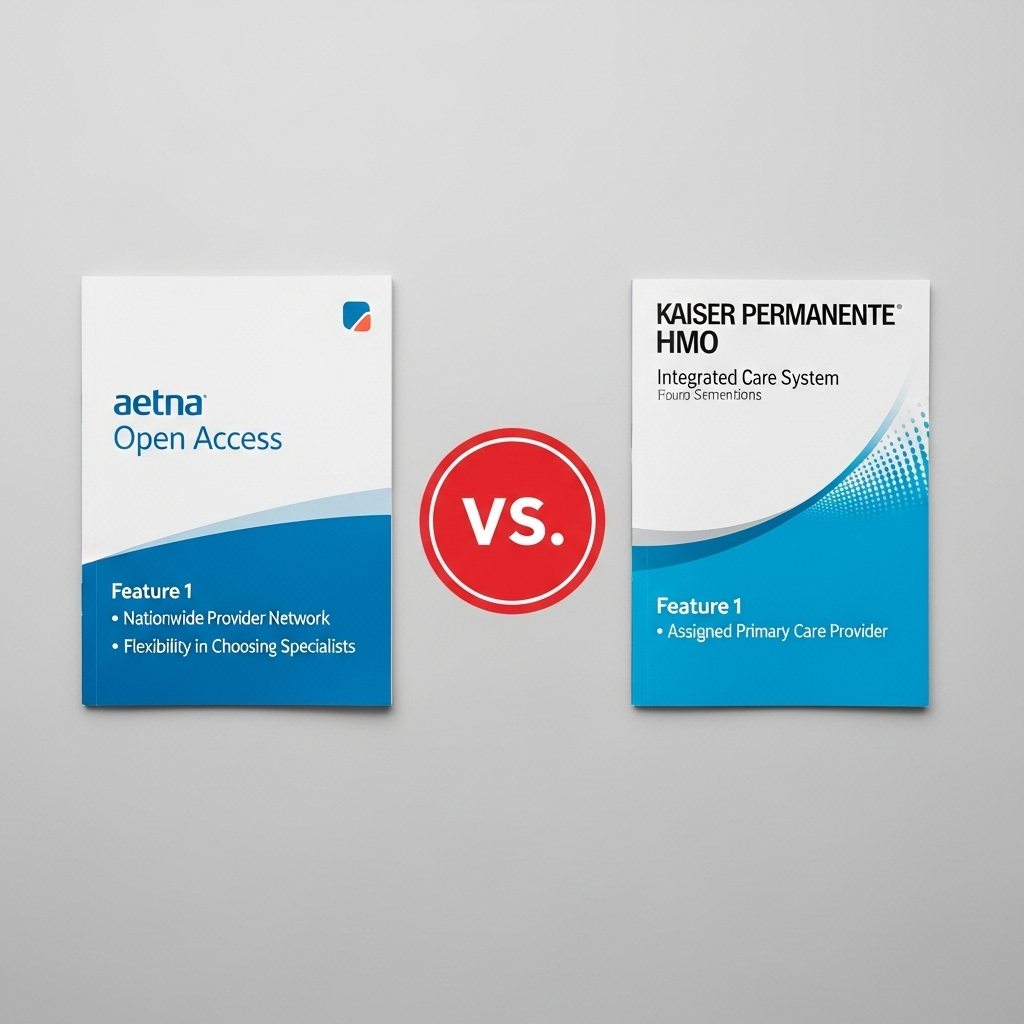Health insurance plans: Aetna Open Access vs. Kaiser Permanente HMO
Quick Verdict
Aetna is better for those prioritizing network size and flexibility, while Kaiser Permanente is suitable for those seeking integrated care and lower costs within their system.
- Aetna offers a larger network, but out-of-network coverage may be limited.
- Kaiser Permanente emphasizes preventive care and has generally lower costs, but requires referrals and has limited out-of-network coverage.
- Both offer telehealth services, but user satisfaction can vary.

Key features – Side-by-Side
| Attribute | Aetna Open Access | Kaiser Permanente HMO |
|---|---|---|
| Monthly Premium Cost | Varies by zip code and specific plan options. Refer to the rate calculator for plans available in your area. | Average monthly premium is $501, ranging from $386 for a 21-year-old to $1,049 for a 60-year-old. Varies based on age, location, plan type, metal tier, number of people covered, and smoking status. |
| Deductible Amount | Some plans have no deductible. Others may have a deductible, e.g., $1,200 individual / $3,600 family or $500 individual / $1,000 family. | Many plans have no deductibles; some plans may have a deductible (e.g., $1,000 individual / $2,000 family). |
| Copay for Primary Care Visit | Varies based on the specific plan. Some plans offer primary care visits for as low as $5 or $10. Other plans may have a $20 or $25 copay. | Varies by plan; some plans offer $25 copay, others $35 copay. Some plans may have no charge for office visits. |
| Copay for Specialist Visit | Specialist copays also vary. Some plans offer specialist visits for $20. Other plans may have a $30, $35, $40, or $55 copay. | Varies; one plan lists a $40 copay, another $45 copay. Some plans require referrals. |
| Out-of-Pocket Maximum | Varies by plan. Some examples include: Individual: $1,100 / Family: $2,200; Individual: $1,500 / Family: $3,000; Individual: $6,000 / Family: $6,000; Individual: $6,850 / Family: $13,700 | Varies by plan; e.g., $1,500 individual / $3,000 family or $3,500 individual / $7,000 family. |
| Referral Requirements for Specialists | Many plans do not require referrals to see in-network specialists. However, some plans, particularly in California, may require referrals from a primary care physician (PCP) to see specialists. | Typically required; some plans allow self-referral to certain specialists. Standing referrals may be available for chronic conditions. |
| Out-of-network Coverage | Some plans do not offer out-of-network benefits. Other plans may offer some out-of-network coverage, but typically at a higher cost. | Generally limited, potentially resulting in higher costs. Covers emergencies and urgent care. Prior authorization usually required for non-emergency services. |
Overall Comparison
Network: Aetna wins; Referrals: Aetna wins; Preventive Care: Kaiser wins; Out-of-Network: Aetna wins; Cost: Kaiser wins (potentially)
Pros and Cons
Aetna Open Access
Pros:
- Large nationwide network of doctors and specialists
- Many plans do not require referrals to see in-network specialists
- Preventive care coverage emphasized
- Offers telehealth services
Cons:
- Out-of-network coverage may be limited or unavailable in some plans
- Referrals may be required in some plans, particularly in California
- Copays and deductibles vary significantly by plan
- Monthly premium comparison to benefits and coverage is not available
Kaiser Permanente HMO
Pros:
- Focus on preventive care services and wellness programs
- Offers telehealth services
Cons:
- Out-of-network coverage is generally limited
- Referrals are typically required to see a specialist
- Satisfaction can vary
User Experiences and Feedback
Aetna Open Access
What Users Love
- Large nationwide network of doctors and specialists
- Many plans don't require referrals
- Telehealth services accessibility and quality
- Support for preventive care services and wellness programs
Common Complaints
- No major complaints reported.
Value Perception
- No value feedback reported.
Kaiser Permanente HMO
What Users Love
- Some reviewers express satisfaction with the range of in-network options.
- Kaiser Permanente is known for its focus on preventive care services and wellness programs.
Common Complaints
- Some find it challenging to get referrals to experienced specialists.
- It can be a challenge to get referrals to specialists.
- Clarity and ease of understanding can vary.
- Responsiveness and helpfulness of customer service can vary.
- Satisfaction varies depending on whether necessary medications are included in the formulary and the associated costs.
- Ratings of telehealth services in terms of accessibility and quality can vary.
- How effectively the plan handles claims processing and reimbursement can vary.
- Satisfaction can vary.
Value Perception
- The value of the monthly premium compared to the benefits and coverage provided can vary.
- Kaiser Permanente is known for its low costs.
User Recommendations
- All referrals must be approved before you receive services.